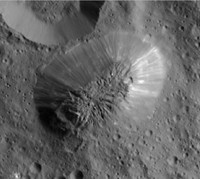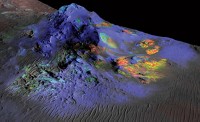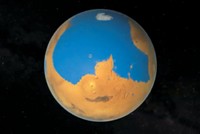Advertisement
Grab your lab coat. Let's get started
Welcome!
Welcome!
Create an account below to get 6 C&EN articles per month, receive newsletters and more - all free.
It seems this is your first time logging in online. Please enter the following information to continue.
As an ACS member you automatically get access to this site. All we need is few more details to create your reading experience.
Not you? Sign in with a different account.
Not you? Sign in with a different account.
ERROR 1
ERROR 1
ERROR 2
ERROR 2
ERROR 2
ERROR 2
ERROR 2
Password and Confirm password must match.
If you have an ACS member number, please enter it here so we can link this account to your membership. (optional)
ERROR 2
ACS values your privacy. By submitting your information, you are gaining access to C&EN and subscribing to our weekly newsletter. We use the information you provide to make your reading experience better, and we will never sell your data to third party members.
Astrochemistry
Ammonia points to volcanism on Pluto
Chemical is short-lived on planetary surfaces
by Sam Lemonick
June 1, 2019
| A version of this story appeared in
Volume 97, Issue 22

Since New Horizon’s 2015 flyby of Pluto, scientists have been studying the craft’s high-resolution photographs of the dwarf planet. A group of researchers led by Dale P. Cruikshank of NASA Ames Research Center and Cristina M. Dalle Ore, a member of the center as well as the SETI Institute, noticed one trench that was brighter in color than the surface around it. Closer examination showed that nearby craters and troughs had a smoother appearance than the surrounding area. IR spectra from the same spacecraft indicated these regions had higher concentrations of water ice and ammonia than the surrounding area. The researchers say that, all together, the evidence suggests that a cryovolcano, or ice volcano, had erupted inside the trench (Sci. Adv. 2019, DOI: 10.1126/sciadv.aav5731). The presence of ammonia in the trench led the researchers to conclude that eruption happened within the last billion years; otherwise, ultraviolet radiation and ionic bombardment would have destroyed the compound. Dalle Ore says the discovery supports previous suggestions that Pluto has active volcanism and an internal ocean, from which this eruption would have originated.





Join the conversation
Contact the reporter
Submit a Letter to the Editor for publication
Engage with us on Twitter